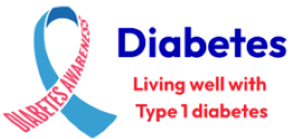Being diagnosed with Type 1 diabetes can feel overwhelming at first, but with the right tools, support, and knowledge, you can lead a healthy, full life. This article offers practical guidance on navigating life with diabetes in the UK—covering everything from food choices and tech tools to managing diabetes at work.
Diabetes affects how your body processes glucose (sugar), and managing it involves monitoring blood sugar levels, eating well, staying active, and sometimes taking medication or insulin. Type 1 diabetes is a condition where your body cannot make a hormone called insulin. People diagnosed with Type 1 need to take insulin every day to manage their blood glucose levels.
While there is currently no cure for Type 1 diabetes, it can be managed by checking your blood glucose regularly, tracking what you eat and drink, and adjusting how much insulin you take.
Whether newly diagnosed or supporting someone who is, the key is finding what works for your lifestyle.
Eating Well: Recipes and Meal Ideas
Food is central to diabetes management. A balanced diet can help stabilise blood glucose levels, support weight management, and boost overall wellbeing.
Diabetes UK and other organisations offer free, diabetes-friendly recipes and meal plans:
- https://www.diabetes.org.uk/living-with-diabetes/eating/recipes
- https://realfood.tesco.com/diabetes-recipes.html
- https://www.bbc.co.uk/food/collections/diabetes_recipes
Embracing Technology
Digital tools can make managing diabetes easier and more accurate. Many are available on the NHS or can be bought privately. Ask your GP what might work for you.
- Continuous Glucose Monitors: These devices track your blood glucose in real time. Freestyle Libre is one of the most common in the UK.
- Smart Insulin Pens and Pumps: These offer more flexible insulin management, with programmable settings and tracking features.
- Diabetes Apps: Try apps like MySugr, Glooko, or Carbs & Cals to monitor blood sugar, diet, and medication.
Did you know? Some apps sync with CGMs and can even share data with your healthcare team for ongoing support.
Hypoglycaemia (Hypo)
It can be a good idea to tell your Line Manager and your trusted colleagues if you are Type 1 diabetic. Sharing this may provide support if you experience a hypo at work.
A hypo is when your blood sugar/glucose level drops too low. This is usually below 4mmol/l. This can happen quickly. It’s important to always have hypo treatments with you. It’s also important to know what the signs are and how to treat a hypo if you have one.
Hypos can happen if the balance of food you eat, physical activity you do and diabetes medication you take, especially insulin, sometimes isn’t right. Not everyone with diabetes will have hypos but some things make them more likely. These include:
- missing or delaying a meal or snack
- not having enough carbohydrate at your last meal
- doing a lot of exercise without having extra carbohydrate or without reducing your insulin dose (if you take insulin)
- taking more insulin (or certain diabetes medication) than you needed
- drinking alcohol
- being unwell
- experiencing stress or anxiety
- extreme changes in weather
Find out more about Hypos, signs and symptoms, how to prevent and treat them, at the Diabetes UK website HERE
Living with diabetes is about balance, not perfection. With the right knowledge, tools, and support, you can thrive—at home, at work, and everywhere in between. Remember to take it one day at a time, and don’t be afraid to ask for help when you need it.
